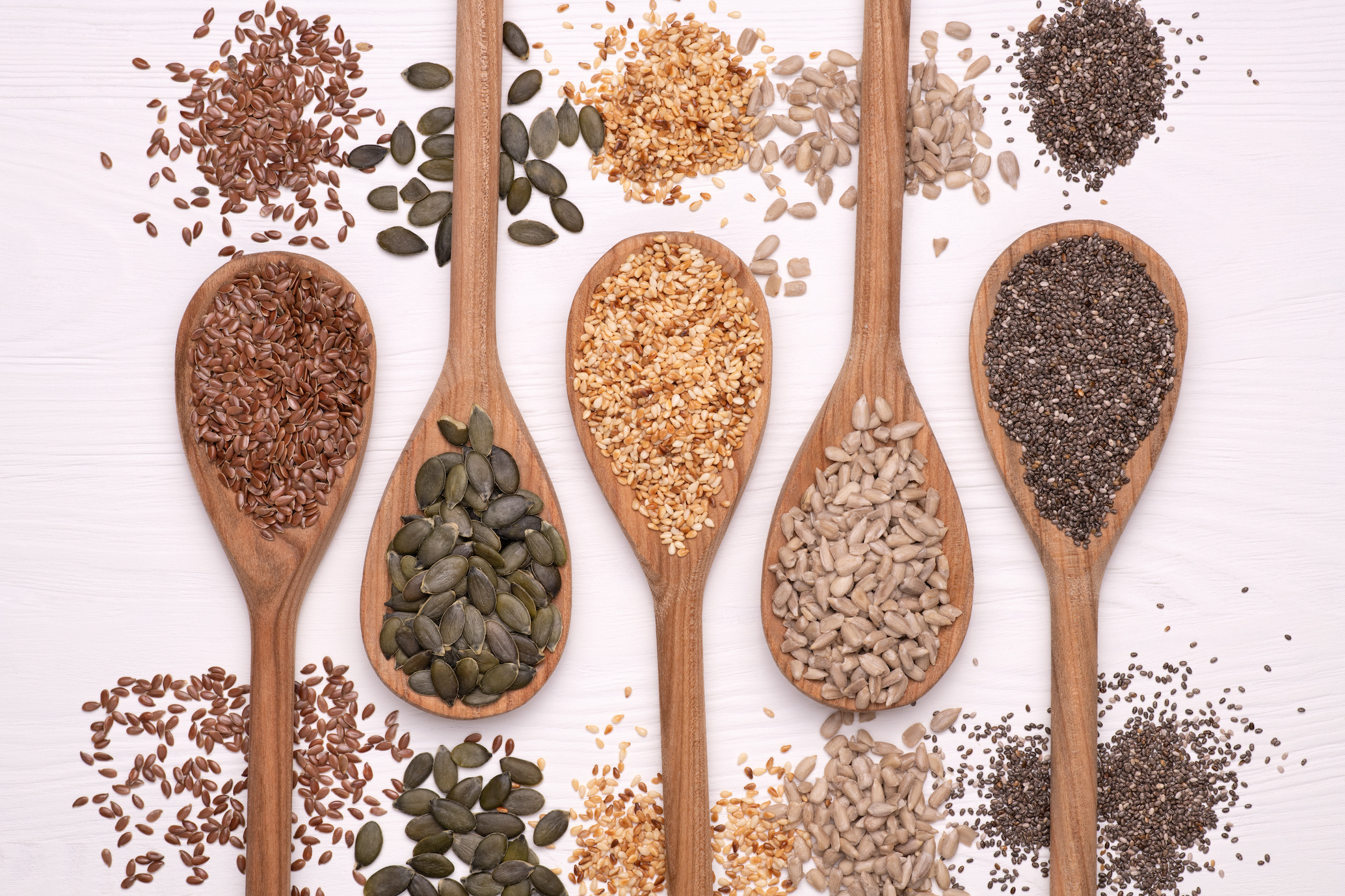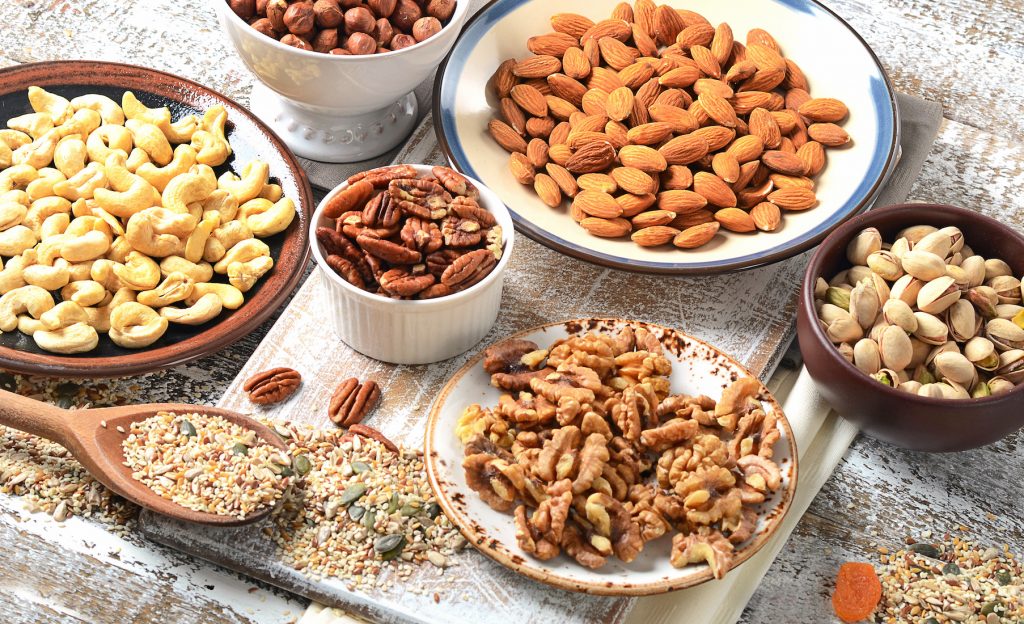
Nuts and Seeds: Small Superfoods with Big Brain and Heart Benefits


Last Updated July 9, 2025
If you’re looking for a snack that’s rich in essential vitamins and minerals, may help in weight management, and offers health benefits to both your brain and heart, then consider adding a handful of mixed nuts to your daily diet.
Nuts and seeds are highly nutritious, low in carbs, and jam-packed with fiber, protein, antioxidants, essential vitamins and minerals, and an array of phytochemicals. Research suggests that eating nuts and seeds can lower the risk of certain conditions like high blood pressure, high cholesterol, and inflammation that can lead to heart disease, diabetes, cancer, and stroke.
Although nuts and seeds pack a wallop of nutrients and complement a well-balanced diet, they’re best eaten in moderation because of their high fat and caloric content. Fortunately, they’re high in unsaturated fats and omega-3 fatty acids, which are preferred heart-healthy substances. However, eating them in excess can be counterproductive.
Why Nuts and Seeds Deserve a Place in Your Diet
Nuts and seeds are considered superfoods, meaning a little can go a long way in providing health benefits. These superfoods:
- Won’t affect your lipids. Consuming them in moderation won’t increase your triglycerides or cholesterol. Research shows consumption does not affect your lipid panel, and can positively impact weight and blood pressure.
- Contain omega-3 fatty acids. Although we typically think of fish when we hear about omega-3 fatty acids, many nuts are also rich in this nutrient. These nutrients can help keep the heart, lungs, blood vessels, brain, and immune system functioning properly.
- Are packed with fiber. Fiber is necessary to regulate the immune system, fight inflammation, and help keep the bowel system regular. If you’re over the age of 50, the National Academy of Medicine recommends 21 grams of fiber per day for women and 30 grams per day for men. A handful of nuts provides nearly four grams of fiber.
- Contain Vitamin E and L-arginine. Nuts and seeds are a great source for Vitamin E, which deters the development of plaque in your arteries. L-arginine is a substance that can improve blood flow by making the artery walls more flexible and less prone to blockages.
- Are a protein source. Some nuts and seeds are higher in protein than others, which makes eating a variety a good idea. Protein helps your body maintain muscle, repair cells and generate new ones. Protein should be about 15 to 25 percent of your daily calories. For older adults, that translates to 25 to 30 grams of protein per meal.
- Are antioxidant powerhouses. Antioxidants aid in reducing inflammation and oxidative stress. Walnuts, in particular, have been shown in studies to suppress oxidative stress by neutralizing free radicals.
- Contain phytosterols. This substance may help lower cholesterol.

How Often Should You Eat Nuts and Seeds?
The American Heart Association recommends eating about five servings of unsalted nuts a week, preferably raw or dry-roasted options. A serving is about a small handful of nuts and about a tablespoon of seeds.
Most nuts contain a host of beneficial nutrients. For good heart health, choose walnuts, almonds, macadamia nuts, hazelnuts, and pecans. Select walnuts and almonds for their antioxidant properties. To promote weight loss, opt for almonds. Pistachios may help reduce triglycerides plus fight inflammation. Brazil nuts are beneficial in fighting inflammation as well. So, when you eat an assortment, you cover all your bases.
Easy Ways to Add Nuts and Seeds to Your Diet
- Add pumpkin seeds to salads, oatmeal, rice, sweet potatoes, and quinoa for added flavor, fiber, and texture.
- Add nuts and seeds—like pine nuts, sunflower seeds, chia seeds, and pumpkin seeds—to smoothies. These choices are great for their protein, fiber, and omega-3 nutrients.
- Prepare your own trail mix with a blend of nuts and seeds and add the mix to yogurt or enjoy a handful as a snack.
The Bottom Line: Nutrition That Fuels Your Body and Brain
A well-balanced diet that includes eating nuts and seeds can deliver a host of heart- and brain-health benefits. The key to enjoying this nutritious, high-fiber superfood is in moderation.
At Aviv Clinics, we understand that optimal brain and body performance starts with the right fuel. As part of the Aviv Medical Program, many of our clients receive one-on-one dietary coaching tailored to support cognitive function, cardiovascular health, and overall well-being. Nutritional counseling is one of the many therapies we offer as part of the personalized Aviv Medical Program.
Whether you’re managing an existing condition or looking to elevate your brain performance through better nutrition, our team is here to help you make smart, sustainable choices.
Aviv Medical Program provides you with a unique opportunity to invest in your health while you age.




